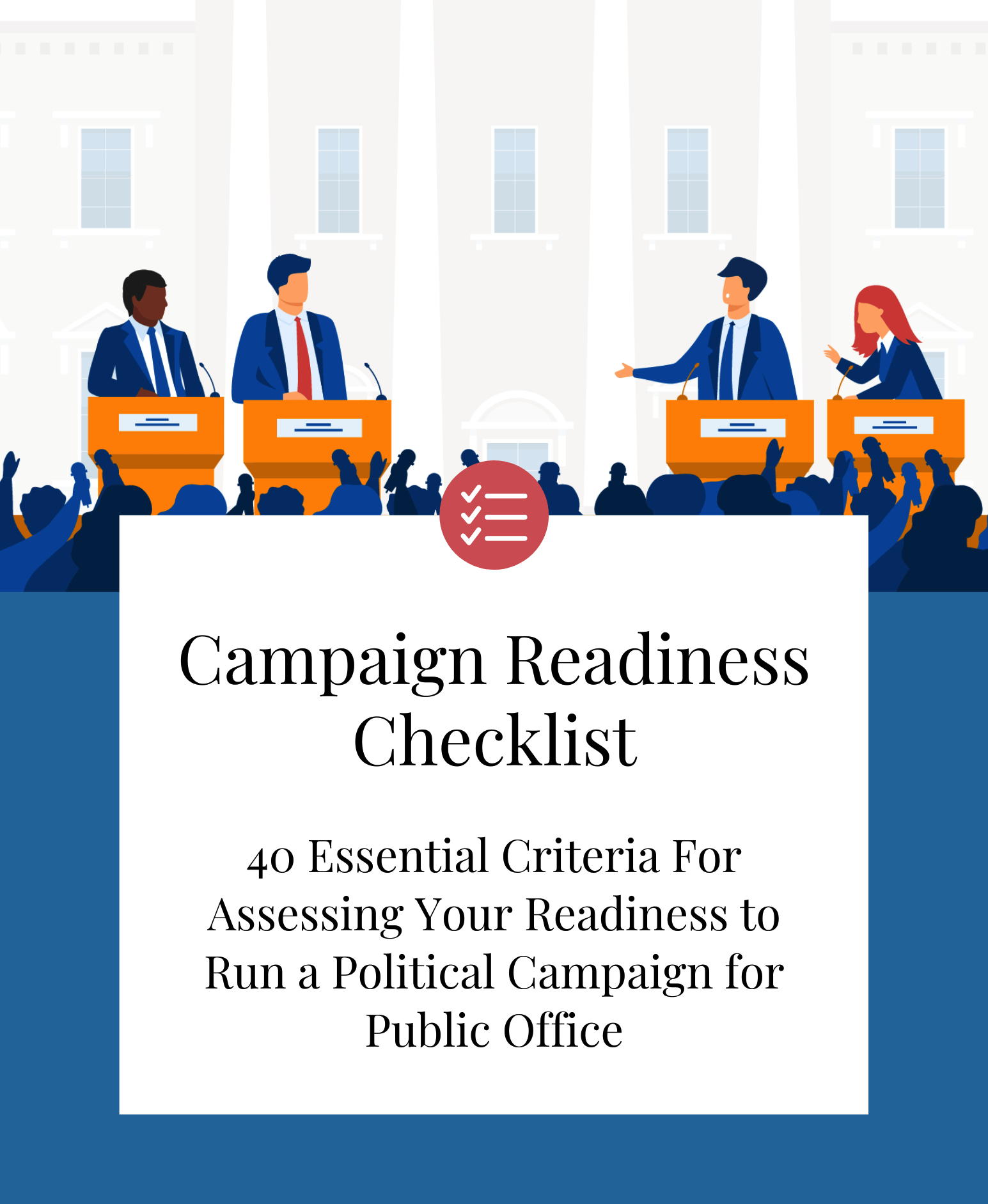Every voting district has legal requirements to run for public office before you can be considered a candidate. These rules are typically called Ballot Access Requirements. You must meet these basic legal requirements before you can be an official candidate and have your name show up on the ballot for any given election.
Types of Ballot Access Requirements
Ballot access requirements include things like a minimum age, a minimum length of residency in the district, an advanced professional degree, a minimum number of petition signatures, and sometimes even a filing fee.
Here are a few examples of legal requirements around the country for various offices:
- City council person in the City of Pittsburgh: you must be a resident of the district for which you are running and have lived in that district for at least one year before the election.
- Governor of Rhode Island: you must be a U.S. citizen for at least 30 days, a resident of the state for at least 30 days, not be under any other oath of office or hold any other state or federal office, and you must not be serving a sentence or on probation or parole for any felony.
- District Court Judge in Texas: you must be a citizen of the U.S., between the age of 25 and 74, resident of the district for 2 ears, and a practicing lawyer or judge (or both combined) for at least 8 years.
How Legal Requirements to Run for Public Office are Created
The rules for elected office are usually codified in state law. Each district and each office can have different rules, and while the state is the ultimate authority on the law, it typically delegates the administration of local laws for local offices to the county where that race is on the ballot or the election board governing that district. So, to find out the legal requirements for your district, start with your Secretary of State. Don’t rely on what you find through web searches. Sometimes these documents, issued as PDFs, are posted on websites and left up for years even though they may not be the most current guidance. It’s okay to run a web search like: “Ballot Access Requirements for Judge in Allegheny County, PA,” but make sure the link you click on is from an official source, like the state government or the county election board. Running that same search listed above yields several results in top positions that are NOT from official sources. Now, Ballotpedia is usually a good source of info, but they’re not infallible. Again, in the case above, it’s the 3rd link from the top that takes you to the county website, and then you need to find candidate resources section which finally lists a link for Elective Office Requirements. It’s always a good idea to call the election board and confirm any information you find online.
Looking at those requirements, you’ll see there is also a required filing fee for some races and a required number of signatures one must get on petitions to qualify for the ballot. For example, to run for School Director of a borough or township in Allegheny County one must obtain at least 10 signatures from local registered voters but there is no fee to file.
In PA, there are no requirements for State Treasurer, but to be a Treasurer in a 3rd Class City, the candidate must be a “Competent Accountant” which usually means they have a degree in accounting or have obtained commonly accepted licensure like CPA, and have not been convicted of some monetary crime like fraud, or embezzlement, etc.
Partisan Requirements for Ballot Access
Partisan elections require you to obtain those signatures from a member of the same registered party for which you are running. For example, if you’re running in a primary as a Democrat, a 100 signature requirement usually means you need to obtain signatures from 100 Democrats — not just any voter.
If you’re running on a minor party ticket, like the green party or independent party, some states make you obtain more signatures than those of your major party (Republican or Democrat) opponents. That doesn’t seem fair, and it’s not! Remember, the people in power are the ones who make the laws. And in most cases, the ones in power want to stay in power, which is why you see requirements that make it harder for some to run.
To complicate matters further, every state puts some type of time requirement on obtaining petition signatures. In Pennsylvania, that time is limited to 3 weeks, usually in the dead of winter. Hope you have a warm coat for canvassing during snow storms!
What Happens if You Don’t Meet the Legal Requirements
If you don’t meet the legal requirements you can’t get your name on the ballot. Period. You can’t even be written in. It means you’re not a candidate and you’re not going to be elected.
Some people run without ever knowing the legal requirements to run for public office. They announce their campaign, start raising money, and then later get knocked off the ballot in court when their opponent challenges their qualifications.
I remember a race of a person running for local judge, which had a 2-year residency requirement. The candidate had bought a house in the district but had been living in another town. An opponent filed a challenge in court and they actually read affidavits from neighbors living near the house in-district which confirmed no one had actually been living there. That candidate was thrown off the ballot by the judge and the opponent ended up running uncontested.
In another race, a State Representative who had run uncontested for years finally got a challenger. They were both registered Democrats. The challenger did not gain access to current voter roles so when he got signatures for petitions he ended up getting hundreds of signatures from people who didn’t actually live in the district. When the signatures were challenged in court, the judge struck the invalid signatures down which left the candidate with fewer than the number required to qualify. The incumbent then ran unopposed.
Believe it or not, candidates entering the race without any idea of the legal requirements for that office happens all the time. In the end, all it does is waste time and money and the confidence of the voters who supported that candidate. At its worst, it can create animosity between voters who may not like the choice of candidate left on the ballot.
I’ve also known candidates who have poured thousands of their own dollars into their races, hiring staff or paying professionals to gather signatures for them — only to be kicked off the ballot for not meeting a requirement — wasting all that money, time, and energy.
Summary
There is no one-size fits all when it comes to getting on the ballot, though the legal requirements to run for public office within the state are typically uniform and don’t change very often. Still, they can and will change from time to time, so the best practice here is to check, and then double check, and then triple check the requirements to make sure you know exactly what is required before you start spending money on your race.
Start with your secretary of state’s office (SOS) and then work down to local governments. Check with election board workers and get what you can in writing! If you download a requirement sheet from the web, confirm it with the SOS. For instance, the National Conference of State Legislatures (NCSL) lists each state’s requirements to run for the state legislature. It’s great info and a good starting point, but confirm everything with your state SOS.
If you’re turning in petition signatures, get a receipt from the elections board and ALWAYS make photocopies for your records. If someone challenges you, having backups can make the difference in court.



